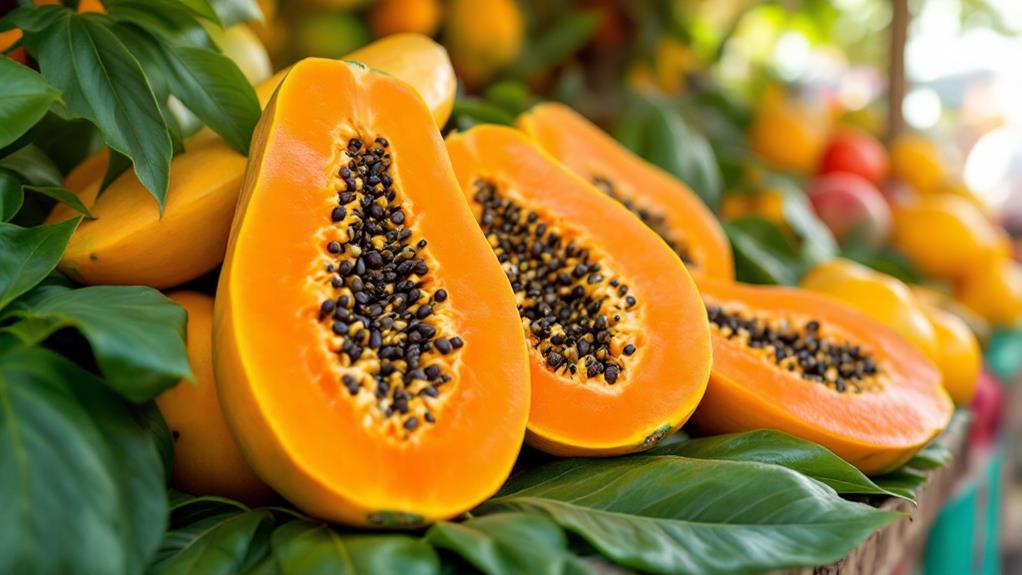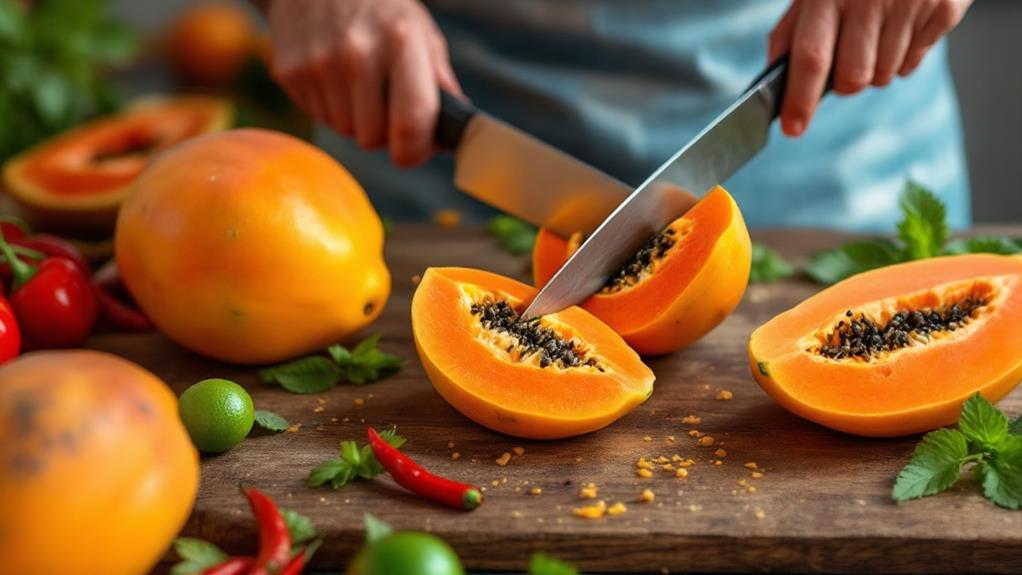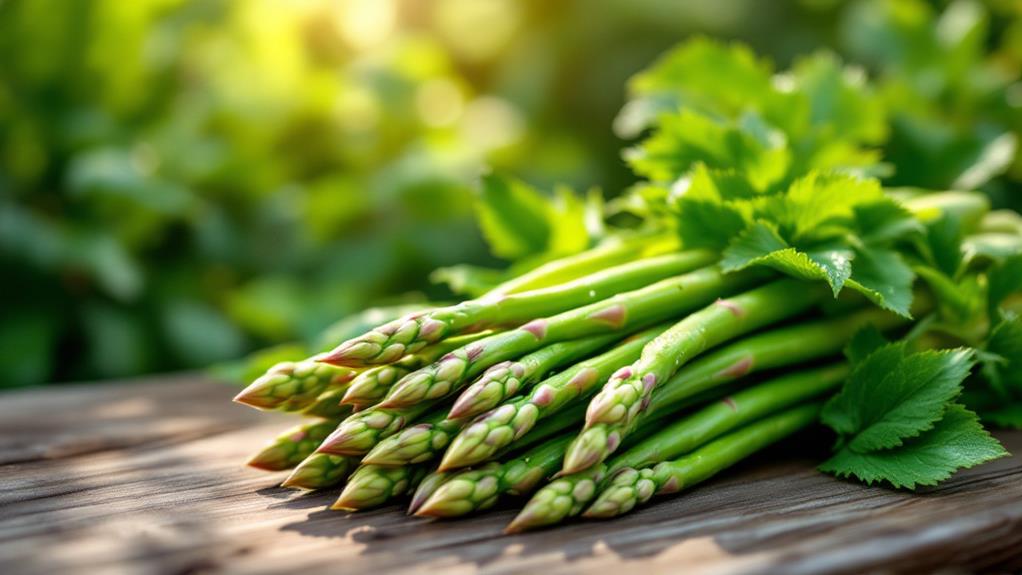Papayas: Buying Considerations and Their Health Benefits

When buying papayas, opt for those with skin that shows lively yellow or orange hues and yields slightly to gentle pressure, indicating ripeness. Avoid papayas with excessive green spots or blemishes, as these signs suggest immaturity or spoilage. Exploring organic options might also reduce pesticide exposure. Health-wise, papayas are rich in vitamin C, dietary fiber, and antioxidants like lycopene, supporting digestion, bolstering the immune system, and potentially lowering cancer risks. They also offer benefits like maintaining heart health and enhancing skin health. There's more to uncover about papayas' flexibility and their diverse culinary applications.
Understanding Papaya Varieties
When diving into the world of papayas, it is essential to know the different varieties available. You'll find two main types: the Mexican papaya and the Hawaiian papaya. The Mexican papaya is larger and more common in the US market. Within this category, the Maradol is the predominant cultivar, appreciated for its sizeable fruit and lively orange flesh. On the other hand, the Hawaiian papaya is smaller and sweeter, with the Solo cultivar being the most popular. If you're seeking something versatile, the Thai Green papaya might catch your interest. It's usually consumed when unripe and is a staple in traditional Thai dishes, adding a unique crunch and flavor.
For those conscious about genetic modification, note that about 82% of Hawaiian papayas are GMO, specifically bred to resist the papaya ringspot virus. However, if you prefer non-GMO options, consider the Kapoho and Sunrise varieties. These are not genetically modified and are available as organic papayas, which also guarantees they're less exposed to pesticides. Understanding these differences will help you choose the right papaya for your needs, regardless of whether you're enjoying it fresh or incorporating it into your favorite recipes.
Selecting the Perfect Papaya
Having investigated the varieties of papayas, let's talk about how to select the perfect one. When you're selecting a papaya, check the skin color initially. A mostly yellow or orange papaya indicates ripeness and promises a sweet flavor. Avoid those with too many green spots, as they are unripe and not ideal for immediate consumption. The fruit should yield slightly to gentle pressure, signaling it's ripe. However, if it's overly soft with dark, shriveled skin, it's likely overripe.
For the best balance of flavor and nutrition, opt for medium-sized papayas, especially around 1 lb if you're choosing Hawaiian varieties. They tend to have a more concentrated taste and better nutritional profile. If you're planning to use papayas for culinary uses, like savory dishes, slightly unripe green papayas are your best bet. On the other hand, ripe papayas are perfect for fresh eating or desserts.
Be cautious of significant bruising or blemishes, as these can indicate spoilage, diminishing both quality and flavor. By carefully selecting your papaya, you guarantee a delicious addition to your diet, enhancing both taste and nutritional benefits.
Nutritional Value of Papayas

Papayas pack a powerful nutritional punch, making them a fantastic improvement to your diet. With just 119 calories in a medium-sized fruit, papayas provide an abundance of crucial nutrients. They're exceptionally high in vitamin C, offering over 200% of your daily requirement, which boosts your immune system and skin health. The fruit also contains significant amounts of vitamin A, folate, and potassium, supporting numerous bodily functions.
Incorporating papayas into your meals contributes valuable dietary fiber, with 4.7 grams per serving, aiding in maintaining healthy digestion and weight management. Despite their natural sugars content of about 21.58 grams, papayas remain low in fat, with less than 1 gram per serving, making them a heart-friendly choice. You'll also benefit from the antioxidants present in papayas, including carotenoids and lycopene, which help combat oxidative stress and may reduce the risk of chronic diseases.
Additionally, papayas offer vital nutrients like magnesium, copper, and pantothenic acid, improving their overall health benefits. By adding papayas to your diet, you can enjoy a delicious fruit that's not only nutritious but also supports your well-being in multiple ways.
Digestive Benefits
Digestive harmony is one of the remarkable benefits you'll enjoy by including papayas in your diet. This tropical fruit is high in dietary fiber, providing about 2.5 grams per cup, which is vital for promoting regular bowel movements and preventing constipation. By keeping things moving smoothly, you'll maintain peak gut health. Moreover, papaya contains the enzyme papain, which plays a significant role in breaking down proteins. This not only facilitates digestion but also helps reduce bloating and discomfort often associated with heavy meals.
Papaya's contribution to digestive benefits doesn't stop there. With an impressive 88% water content, it aids in hydration, fundamental for smooth digestive function. Proper hydration supports the digestive tract, ensuring that everything functions seamlessly. In addition, papaya's natural sugars are gentle on your digestive system, making it an ideal choice for those with sensitive stomachs.
The fruit also offers prebiotic effects, promoting the growth of beneficial gut bacteria. This can lead to improved general gut health and a reduced risk of diverticular diseases. By regularly incorporating papaya into your meals, you'll support your digestive system and improve your overall well-being.
Immune System Support

While supporting your digestive system, this lively fruit also plays a significant role in strengthening your immune defenses. Papaya is packed with vitamin C, providing over 200% of the daily requirement in just one medium-sized fruit. This makes it an excellent choice for improving your immune system and augmenting your body's ability to fend off infections. With about 88.3 mg of vitamin C per cup, papaya nearly meets the daily needs for both men and women, ensuring you're well-equipped to tackle seasonal colds.
But that's not all—papayas are rich in antioxidants like beta-carotene and lycopene. These compounds are vital in reducing oxidative stress and inflammation, which are often precursors to chronic diseases. The health benefits of these antioxidants further support your immune health, making papayas a smart supplement to your diet.
Moreover, the beta-carotene in papayas converts to vitamin A, which maintains healthy mucous membranes. These membranes are your immune system's primary line of defense against pathogens. Regular consumption of papaya can improve your immune function, thanks to its nutrient profile, potentially lowering your risk of chronic diseases and infections.
Papaya's Role in Disease Prevention
Although often enjoyed for their sweet taste and lively color, papayas offer significant benefits in disease prevention. Packed with antioxidants like lycopene, papayas may reduce the risk of certain cancers, including prostate cancer, by potentially slowing tumor growth. The high vitamin C content in papaya plays an essential role in lowering cholesterol levels, which can reduce your risk of heart disease and stroke.
Consuming papaya also improves gut health, thanks to its rich fiber content. This fiber aids digestion and might lower your risk of colon cancer, promoting general digestive wellness. Papaya's antioxidants combat oxidative stress and inflammation, two factors associated with chronic diseases like Alzheimer's. By reducing these factors, papayas contribute to a healthier, balanced lifestyle.
Furthermore, papayas contain carotenoids that support eye health, potentially reducing the risk of age-related macular degeneration. This benefit guarantees your eyes remain in top condition as you grow older, providing long-term protection against vision-related issues. By incorporating papayas into your diet, you're actively participating in disease prevention and supporting your general well-being. So, next time you're at the market, consider adding papayas to your basket for their health-promoting properties.
Culinary Uses and Recipes

Papayas not only contribute to disease prevention but also shine in the culinary world with their adaptable uses and delightful taste. This tropical fruit's sweet flavor makes it a fantastic enhancement to a range of recipes. You can enjoy ripe papaya raw by slicing it open, removing the seeds, and savoring its lively orange flesh. Perfectly ripe when the skin turns yellow or orange and feels slightly soft, it complements tropical fruit salads with pineapple and mango.
For a revitalizing treat, blend ripe papaya with banana, yogurt, and milk to create a nutritious smoothie. If you like, add a touch of honey for extra sweetness. The health benefits of papaya extend to its seeds, which, though bitter, can be used sparingly to impart a peppery kick to your dishes.
Unripe papaya, cherished in Thai cuisine, offers a crunchy texture and tangy taste. You can shred it for salads, adding a unique twist to your meal. Regardless of incorporating papaya's sweet flavor into desserts or using its seeds as seasoning, this tropical fruit's culinary uses are both manifold and healthful.
Potential Risks and Considerations
When considering the potential risks of papaya consumption, it's essential to be aware of certain health considerations. If you have a latex allergy, papaya could trigger severe allergic reactions, such as hives or respiratory difficulties, and in rare cases, anaphylaxis. Unripe papaya is particularly risky for pregnant individuals due to its high latex content, which can cause uterine contractions. As a result, it's best to avoid it during pregnancy to prevent any potential risks.
Excessive consumption of papaya seeds can lead to digestive issues, including diarrhea and stomach upset. Men trying to conceive should also be cautious, as these seeds might impact sperm motility. When introducing papaya to your diet, especially for the initial time, monitor for any allergic reactions, particularly if you have a history of sensitivities.
While papaya offers potential benefits, such as its role in managing metabolic disorders by reducing inflammation and oxidative stress, be wary of unverified health claims. Research is ongoing, so it's significant to maintain a balanced approach and consult a healthcare professional if you're unsure about incorporating papaya into your diet, especially if you have specific health concerns.




